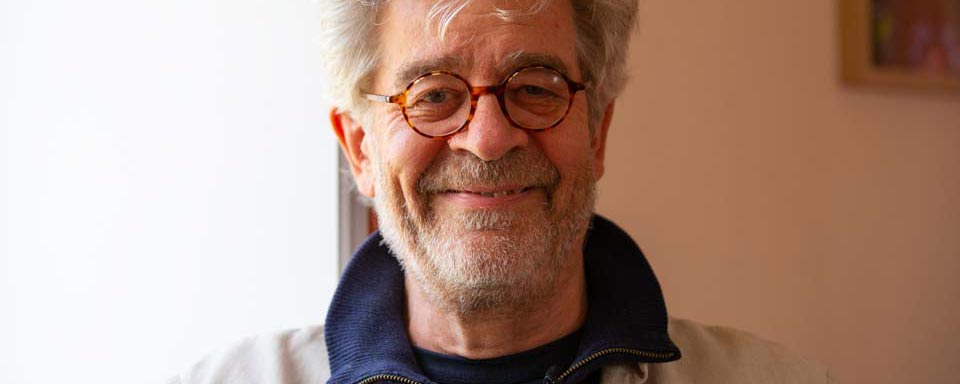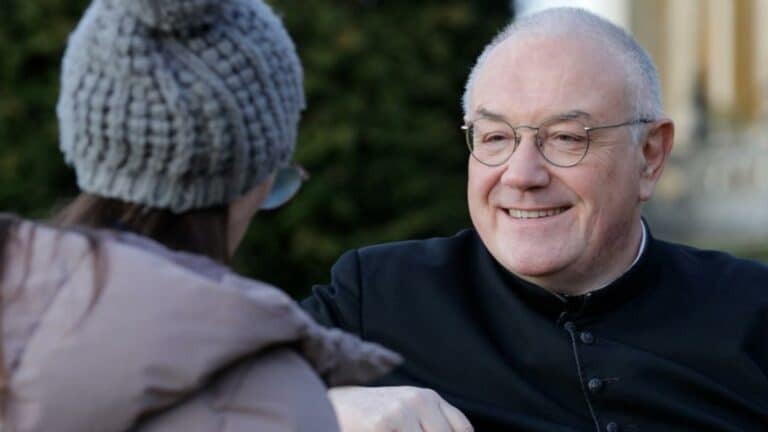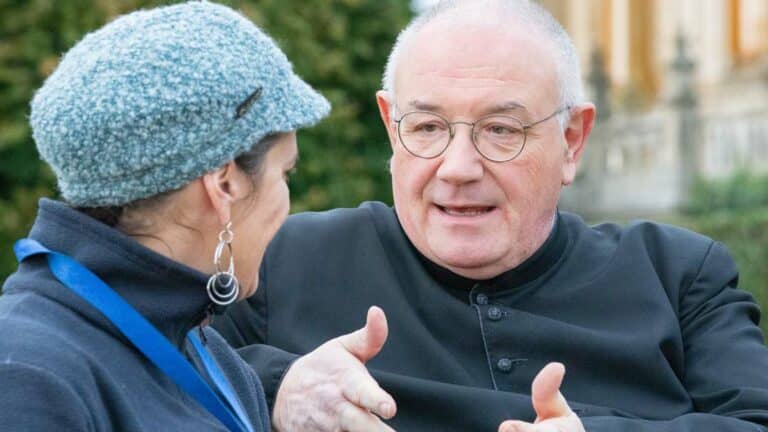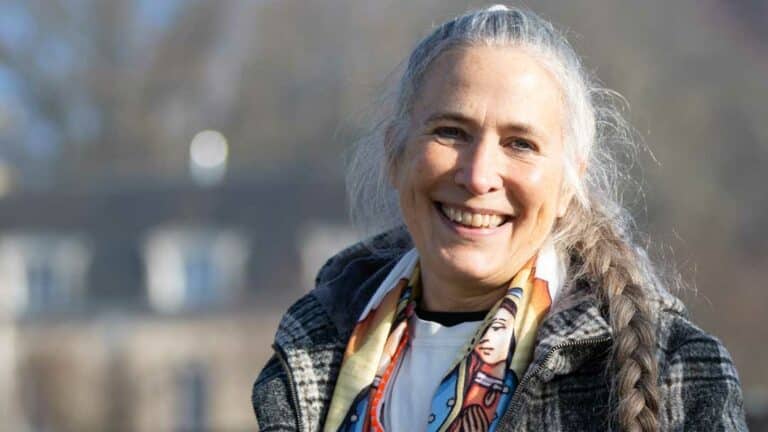Philosopher and neighbour of the shrine, Damien Le Guay took part in the training of bereavement teams training session in September 2023 set up at the shrine of Our Lady of Montligeon.
Although the dead represent an important part of his work, Damien Le Guay addresses first and foremost the living. He stresses the importance of experiencing bereavement as a spiritual experience that encompasses both the religious and the psychic. He advocates for opening up spaces in society so that the psychic reality of bereavement can be fully acknowledged.
Surviving bereavement
How can we take charge before, during and after a demise, such grief brought about by death that has taken place and that suddenly happened, completely reconfiguring who I am in relation to the one who was?
The one who was here, who was so important, so essential to my personal construction, with elaborating my life, and who I am, with my expectations or probing and the answers that that he or she used to provide me with?
The invisible mourning
This person is both absent and totally present. How does one live with this altogether presence and absence? With this person who is here and yet who isn’t, and with whom I have to live, and yet who is no longer here? With the closeness and immediacy that used to be hers.
My idea is to re-establish continuity on the topic of mourning and grief. Individual responsibility for the grieving process has become negligible, and society does not take sufficiently into account the grieving process, often rendering it invisible.
“Restoring the place of the spiritual for humanity means recognizing the importance of communicating, of reconciliation and of the meaning of relationship with regards to the grieving process.“
Damien Le Guay, September 2023
The prohibition on mourning
Pleading for social recognition of mourning as a complex and prolonged process, Damien Le Guay points out that it can sometimes last for years rather than three months, as stated by the DSM (Diagnostic and Statistical Manual of Mental Disorders). Supporting and caring for the bereaved, and calling for public recognition of bereavement as an essential stage in life, is essential.
How do we get out of this prohibition against long-term mourning? On the other hand, how does one get out of a situation where mourning is resolved solely by the chemical relief of medication?
Death is first and foremost of a metaphysical and spiritual metaphysical nature in itself. It’s not merely the body that dies, it’s not only the person who dies, it’s not just to do with the medical corps in its powerlessness to accompany the person to the end. There’s something more, beyond physical science. And this beyond the physical is the spiritual.
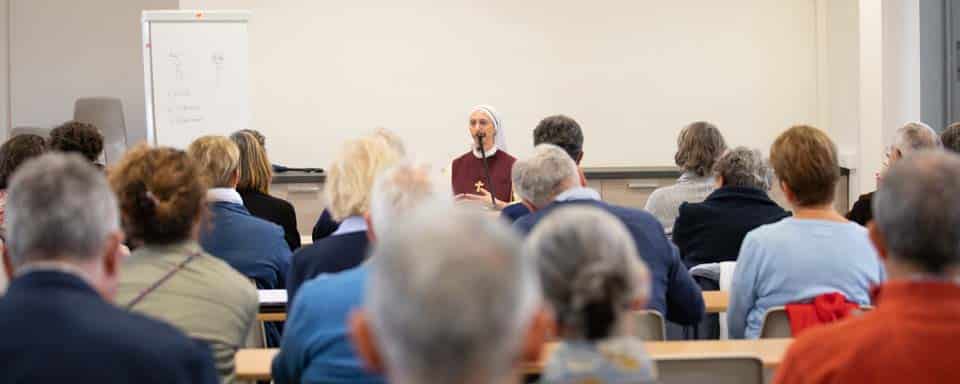
Re-establishing the place of the spiritual for humanity means recognizing the importance of communicating
Bereavement and mourning are above all metaphysical and spiritual experiences, prior to being religious ones. Restoring the place of the spiritual for humanity means recognizing the importance of communicating, of reconciliation and of the meaning of relationship with regards to the grieving process. Minimizing the grief in mourning with religious discourse that insists on rejoicing and salvation in an ordeal that places us all on equal footing when faced with the tragedy of separation is not on.
The spiritual is the spirit talking to itself. It is about seeking the meaning. It’s about the compass that’s disoriented and about wondering what’s going to happen next, or where it’s all going. Religion is one of the elements, a response to this spiritual aspect. The spiritual comes before religion.
The spiritual is neither religious, although it can become so, nor psychological
The challenge is twofold: firstly, not to reduce everything to psychology. The second is not to forget the essential. The essential is suffering, affliction and desolation. It’s the people in pain. We should not run the risk of coupling the spiritual with religion and regard religion as no longer having its place in society, and that “everyone’s on their own”.
We need to restore the noble character of the spiritual, which is neither religious, although it can become so, nor psychological, even if it can appear so. The spiritual is a reality in its own right, our psyche.
We are psychic beings of imagination, cohesion, narrative, meaning and communication. That’s what we are. We’re not merely biological beings. At the moment of death, we are this being, altogether of communication, commitment, meaning, responsibility, the spirit that seeks itself, of the answer we hope to find one way or another, of the questions we seek to ask, of the cries we want to shout.
“I’m going to die one day.
Why don’t we have the means to make an ethical leap towards each other, to give ourselves time to share.“
A useful and productive response to the youth injunction
All this presupposes to find latitude in society, in churches, in places like here, elsewhere, and everywhere in relevant locations, so that psychic reality, stronger than psychology alone, gets fully and totally recognized for its utmost vital importance, and to counteract the present situation that could result, firstly, in a kind of denial and secondly, lead to global depression.
What is crucial is that, subsequently to the emotional cataclysm of bereavement, I find my bearings once more (I who have lost my mother, or my husband, or my wife, or my child…) And when I mention bereavement or grief, I refer to the essential, fundamental, existential, vital state and act of mourning, and I mean fighting against the youth injunction. The injunction relating to being useful to society, productive, able to work, and act as if nothing had happened, to quickly return to normal, to act as if nothing had happened. In doing so, what space for one’s weakness, and that of others, and especially those who no longer finds one’s identify?
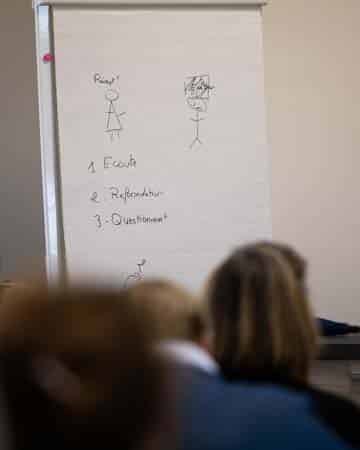
Mourning in solitude
Nowadays everything gets declassed to individual psychology: I have to find my own ways and means of solving my own problem. One can observe that the dead are no longer “visible” in our country. I can only but take stock of the silent revolution brought about by the disappearance of protocols relating mourning and grief, thus, no more specific clothing, no more visits to the family. The garments used to be worn whilst in mourning were as significant as a white cane for the blind.
The wake and the farewell ceremony and subsequently the visibility of the corpse, have all vanished. It’s as if there are no longer any space for the deceased in our homes, within the family scene, or in the village. We have to quickly get rid of them, hide them away and make sure the children don’t see “that”! As if it could harm them. On the contrary, it’s all part of life as it is.
Making time for sharing before death
So then: how do we go about helping our fellow citizens get familiar with the issue of death? Furthermore, second revolution, how to anticipate this topic with one another? Why don’t we address it together?
I’m to die one day. So are we all. Why don’t we have the means to make an ethical leap towards each other, and make time with one another to share about it. Not merely to talk about death when it’s imminent, but also to talk about what I have done to you… About the arguments or squabbles that stand between us… God knows, we all have arguments and dissensions with others! Who are the “others”, first of all, our loved ones and all those we haven’t loved enough. And those who have preferred my brother over me, or this one more than that one.
These quarrels are part and parcel of love, and therefore, of dependence. How can we make time for one another? Try and make it compulsory? Certainly not. But as a proposition, a possibility, as something that would require that we make time before death, in order to talk, to share, to reconcile, and tell one another key things. Such as the essentials we’ve never been able to tell each other: I love you, I didn’t know how to love you…
I did such and such, and maybe you didn’t understand why I did it. I’m sorry for it, please forgive me! Yes, let’s try to walk once more the path of reconciliation that will enable us to move forward.
Dependant of one another, our life story belongs to others
And this process has a double effect: first, to enable the person about to depart to die “in peace” as commonly explained. However, one is ever “totally at peace”, yet, in this occurrence it’ll be with a little more peace, due to reconciliation. Being reconciled with oneself, feeling more responsible. Responsibility is something we tend to collectively shun. No one is responsible for any one. And I, less than anyone else, for myself. That’s a bit of a leitmotif today, isn’t it? How do we go about restoring that sense of responsibility? Because we are dependent on one another. And our history thus belongs to others, in as much as it is shared and blended together. How, on the one hand, can one ease the burden of one’s upcoming death and, on the other, by means of communication, reconciliation, forgiveness, and gestures, ensures this transition from generation to generation in a not so burdensome way? Indeed, it is the living.
Separating the spiritual from religion
I always thought that the question of grief, and mourning, cannot be restricted or suppressed by the religious issue and salvation. Salvation, even if it is a certainty for some, is not likely to minimize or wipe away the intensity of our despair and grief.
The grief we experience, whether we have faith or not, is truly real. It is there and nothing can ever diminish its intensity. Perhaps you can give it a meaning, a direction? Maybe. Or give it some perspective? Why not? But I’m against religious speeches at funerals and religious ceremonies, or funeral Masses, that focus on the word “rejoice”, and “be glad”, the one you love is at peace, in the realm of God, so “be happy”.
It all appears to me as a form of refutation of the pain we feel and rightly so. The Church has to be able to embrace this pain. Even if the prospect of the deceased having reached Heaven could be ascertained. Yet this perspective is in no way a consolation to ease the distress of people in mourning and grieving. What I mean is that spirituality and religion need to be differentiated.
The pain of separation
Indeed, one must altogether acknowledge one’s part in suffering – and God knows that losing a father, mother, partner or child is a subhuman and appalling ordeal – and at the same time, for those who wish to, consider that there is indeed something else after death. A perspective that one who once was doesn’t end, or might not end, or might continue in a different way…
Will we meet again? When, how, where? Mystery!
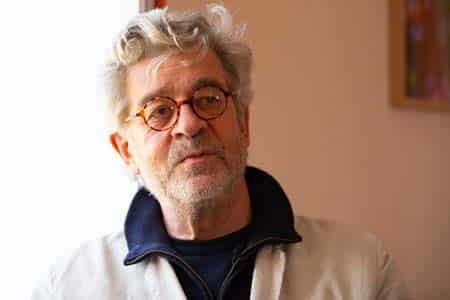
In my opinion, prior to wondering about the existence of God, arises another question
If we succeed rehabilitating the spiritual, we shall succeed restoring some confidence in one or other of the answers that lie ahead. In my opinion, prior to wondering about the existence of God arises the question of man, i.e. before the question of eternal salvation in heaven, comes the question of the meaning I give to my life.
Growing through the ordeal of mourning
Of course such an ordeal can help us grow and refocus. We live in a hectic and fast-paced world, where phones ring all the time and text messages never stop, in a kind of acceleration of time. So what is the testing experience of death and grief, if not the test of duration?
Death is relentlessly present at times and in time, displays both its tragic aspect in the separation, and ushers us into a form of expansion or elation of time itself.
It’s both wonderful and dreadful.
Wonderful, because time takes on an exceptional intensity, due to one’s suffering, because separation is close, or because memories crop up, and because chronologies clash with one another. He’s not here, is he? He’s no more, but he was! Who was my father or my mother, who has gone? It all brings about some kind of depth, density, something that is likely to become a life experience. Too often, we live on the surface of ourselves, of things and of existence.
Looking at death in the face is being alive
Sometimes certain occurrences, in terms of music, literature, love, beauty, the presence of our beloved, and also of our beloved who are departing or have gone, provide us with an exceptional density with regard to living. That’s the paradox of death: we feel alive when death is about. “Let us endeavour to enter eyes wide open” as used to say Marguerite Yourcenar, or Ray Bradbury who said “Live as if you were to die in ten seconds” , that is also to live, or at least to have the possibility of more experiencing live, and not to seek death, and not to be obsessed by it and yet, when confronted to it, to be able to think that there is something there that can enable one to be more alive, even more alive than one may usually be, although one can be sometimes so little so.
—
Every year, the shrine of Montligeon offers 7 “Comforting halts” and 2 “one”Consolation and mourning” sessions to help you
Damien Le Guay‘s bibliography
Qu’avons-nous perdu en perdant la mort ?,
Le Cerf, 2003
Le couvre-tête de Dieu,
Le Cerf, 2007
La cité sans Dieu,
Flammarion, 2010
La mort en cendres (sur la crémation),
le cerf, 2012
Le fin mot de la vie – contre le mal mourir en France, Edition du Cerf, 2014
Les morts de notre vie,
Albin Michel, 2015 (avec Jean-Philippe de Tonnac.)
La guerre civile qui vient est déjà là,
Le cerf 2017
41 exercices d’Hygiène spirituelle,
Salvator, 2020
Quand l’euthanasie sera là…
Salvator, 2022
Damien Le Guay is vice-president of the Comité national d’éthique du funéraire. He teaches at the Espace éthique de l’AP-HP (on the ethics of death) and is a lecturer at HEC. He was interviewed by Jean Leonetti’s first parliamentary commission (“Respecting life, accepting death”, June 2004) on the evolution of death and the loss of rituals. He is a literary critic for “Figaro Magazine”, writes a column for the catholic national magazine “Famille chrétienne”. He is regularly interviewed on (web radio of the Institut de France).

